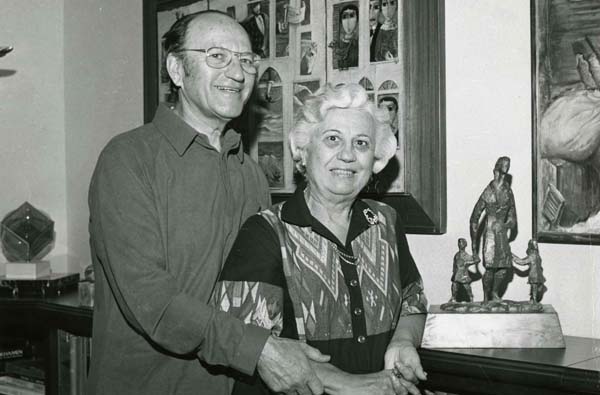
Rauh Jewish Archives at the Heinz History Center
Harold J. Ruttenberg (1914-1998) grew up in Greene County, Pa., where his father owned a general store. While attending American University in Washington D.C. in the early 1930s, he worked as an investigator for the United States Senate Special Committee Investigating the Munitions Industry and also was involved in research for the Brookings Institution.
The work led to his affiliation with the Amalgamated Iron and Steel Workers Union and later to a position at the Steel Workers Organizing Committee, which became the United Steelworkers of America. Ruttenberg gained national recognition prior to World War II as the Steel Union Research Director, the chief economist for the union. He took leave from 1942 to 1944 to work for the War Production Board. In that capacity, he was prominent in the “Steel for Victory” steelmaking drive in Pittsburgh during the summer of 1943.
After the war, Ruttenberg worked to implement his ideas as an executive with the Portsmouth Steel Company in Ohio. He headed up several other companies in the 1950s and 1960s and spent the final decades of his career leading the American Locker Group.
After transferring to the University of Pittsburgh, Ruttenberg met Katherine “Kitty” Monori, who had immigrated in 1927 with her mother to Wilkinsburg, Pa., to rejoin her father, who had arrived in 1924. Her father, Emil Monori, worked as an electrical engineer with Westinghouse Electric Corporation in East Pittsburgh, Pa.
In addition to his work, Ruttenberg was a major supporter of Israeli causes. After the Six Day War in 1967, he offered his services to the country and became involved in high-technology manufacturing. He was chairman of the Rehovoth Instruments Company in Israel from 1968 to 1978. The couple lived in Israel part-time from 1968 to 1973.
In the early 1960s, the Ruttenbergs began collecting art. Their interest increased after moving to Israel. “We were personally acquainted with every major artist in Israel and still count many of them among our friends. Our social circle in Jerusalem was very eclectic, always including some of ‘our’ artists and other collectors,” Kitty Ruttenberg told the Jewish Chronicle in 1998. Over the years, the Ruttenbergs donated hundreds of works to organizations in Israel and Pittsburgh, including to the United Jewish Federation.
In 1991, Kitty Ruttenberg undertook an ambitious project to catalogue Jewish art in Pittsburgh, as part of a larger effort to create a comprehensive international database of Jewish art. The Pittsburgh Index of Judaica and Jewish Art trained volunteers to document ritual objects housed in area synagogues. Among the founding members were Marcia Frumerman and Shirley Stark. The organization later became known as the Kitty Ruttenberg Index of Judaica and Jewish Art. The organization disbanded in 2007.
For More Information
- Harold J. Ruttenberg Papers finding aid
- The Kitty Ruttenberg Index of Judaica and Jewish Art Records finding aid
- The Dynamics of Industrial Democracy, by Clinton S. Golden and Harold J. Ruttenberg
- How to Save and Create Jobs in the Pittsburgh Area; An Analysis of Chronic Unemployment, by Harold J. Ruttenberg
- Kitty, An Uncommon Memoir of a Non-Celebrity, by Katherine M. Ruttenberg
- Reflections and Realities, by Katherine M. Ruttenberg
- The Ruttenbergs of Pittsburgh, by Jim Ruttenberg
- Harold Ruttenberg oral history (NCJW)
- Katherine “Kitty” Ruttenberg oral history, 1985 (NCJW)
- Katherine “Kitty” Ruttenberg oral history, 1992 (NCJW)
- Harold J. Ruttenberg Papers (Penn State University)
